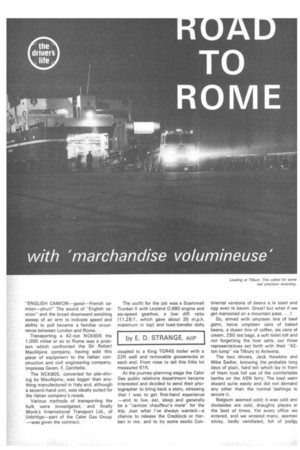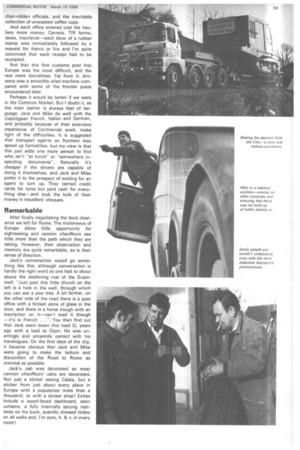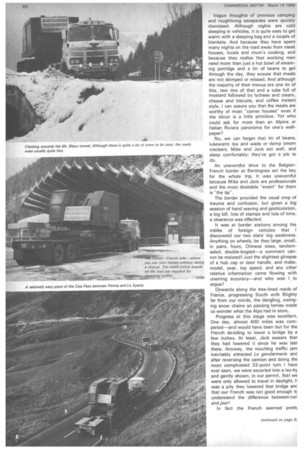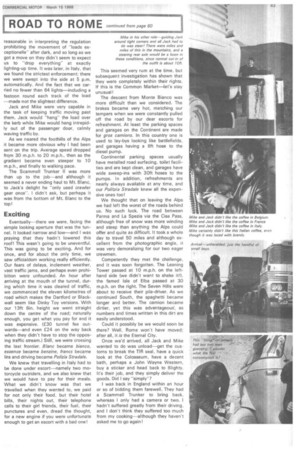[ by E. D. STRANGE, AIIP
Page 60

Page 61

Page 62

Page 65

If you've noticed an error in this article please click here to report it so we can fix it.
"ENGLISH CAM ION—good—French camion—phut!" The sound of "English camion" and the broad downward swishing sweep of an arm to indicate speed and ability to pull became a familiar occurrence between London and Rome.
Transporting a 42-ton NCK605 the 1,000 miles or so to Rome was a problem which confronted the Sir Robert MacAlpine company, having sold this piece of equipment to the Italian construction and civil engineering company, lmpressa Geom. F. Carchella.
The NCK605, converted for pile-driving by MacAlpine, was bigger than anything manufactured in Italy and, although a second-hand unit, was ideally suited for the Italian company's needs.
Various methods of transporting the hulk were investigated, and finally Monk's International Transport Ltd., of Uxbridge—part of the Calor Gas Group —was given the contract. The outfit for the job was a Scammell Trunker II with Leyland 0.680 engine and six-speed gearbox, a low diff. ratio (11.28:1, which gave about 35 m.p.h. maximum in top) and load-transfer dolly coupled to a King TGR45 trailer with a 22ft well and removable goosenecks at each end. From nose to tail this little lot measured 61ft.
At the journey-planning stage the Calor Gas public relations department became interested and decided to send their photographer to bring back a story, stressing that I was to get first-hand experience —and to live, eat, sleep and generally be a "camion chauffeur's mate" for the trip. Just what I've always wanted—a chance to release the Craddock or Harben in me, and to try some exotic Con tinental versions of beans a la roast and egg avec le bacon. Great! but what if we get marooned on a mountain pass... .!
So, armed with umpteen tins of beef garni, twice umpteen cans of baked beans, a dozen tins of coffee, six cans of cream, 250 tea bags, a soft toilet roll and not forgetting the liver salts, our three representatives set forth with their '42ton lump" via Tilbury to Antwerp.
The two drivers, Jack Hawkins and Mike Sadler, knowing the probable long days of plain, hard toil which lay in from of them took full use of the comfortable berths on the ASN ferry. The load went aboard quite easily and did not demand any other than the normal lashings to secure it.
Belgium seemed cold; it was cold and docksides are cold, draughty places al the best of times. Yet every office we entered, and we entered many, seemed sticky, badly ventilated, full of podgv
chair-ridden officials, and the inevitable collection of unwashed coffee cups.
And each office entered cost the hauliers more money. Carnets, TIR forms, taxes, insurance—each blow of a rubber stamp was immediately followed by a request for francs or lira and I'm quite convinced that each receipt had to be receipted.
Not that this first customs post into Europe was the most difficult, and the rest mere formalities. Far from it; Antwerp was a smoothly oiled machine compared with some of the frontier posts encountered later.
Perhaps it would be better if we were in the Common Market. But I doubt it, as the main barrier is always that of language. Jack and Mike do well with the Uxbridgean French, Italian and German, and probably because of their extensive experience of Continental work, make light of the difficulties. It is suggested that transport agents on frontiers may speed up formalities, but my view is that this just adds one more person to find who isn't "at lunch" or "somewhere inspecting documents". Naturally it's cheaper if the drivers are capable of doing it themselves, and Jack and Mike prefer it to the prospect of waiting for an agent to turn up. They carried credit cards for tyres but paid cash for everything else—and took the bulk of their money in travellers' cheques.
Remarkable
After finally negotiating the dock clearance we left for Rome. The motorways of Europe allow little opportunity for sightseeing and camion chauffeurs see little ,more than the path which they are taking. However, their observation and memory are quite remarkable, as is their sense of direction.
Jack's conversation would go something like this, although conversation is hardly the right word as one had to shout above the deafening roar of the Scammell: "Just past this little church on the left is a hole in the wall, through which you can see a yew tree. A bit farther, on the other side of the road there is a post office with a broken pane of glass in the door, and there is a horse trough with an inscription on it—can't read it though —it's in French . . .". You then find out that Jack went down this road 21. years ago with a load to Dijon. He was unerringly and uncannily correct with his travelogues. On the first days of the trip, it became obvious that Jack and Mike were going to make the tedium and discomfort of the Road to Rome as minimal as possible.
Jack's cab was decorated as most camion chauffeurs' cabs are decorated. Not just a sticker saying Calais, but a sticker from just about every place in Europe with a population more than a thousand, or with a sticker shop! Extras include a wood-faced dashboard, satin curtains, a fully internally sprung mattress on his bunk, scantily dressed ladies on all walls and, I'm sure, h. & c. in every room! Vague thoughts of previous camping and roughliving escapades were quickly dismissed. Although nights are cold sleeping in vehicles, it is quite easy to get warm with a sleeping bag and a couple of blankets. And because they have spent many nights on the road away from steak houses, locals and mum's cooking, and because they realize that working men need more than just a hot bowl of steaming porridge and a tin of beans to get through the day, they ensure that meals are not skimped or missed. And although the majority of their menus are one tin of this, two tins of that and a tube full of mustard followed by lychees and cream, cheese and biscuits, and coffee instant style, I can assure you that the meals are worthy of most "corner houses" even if the decor is a little primitive. Yet who could ask for more than an Alpine or Italian Riviera panorama for one's wallpaper?
No, we can forget that tin of beans, lukewarm tea and wads or damp cream crackers; Mike and Jack eat well, and sleep comfortably; they've got a job to do.
An uneventful drive to the BelgianFrench border at Bertingnes set the key for the whole trip. It was uneventful because Mike and Jack are professionals and the most desirable "event" for them is "the tip", The border provided the usual crop of trauma and confusion, but given a big session of hand waving and gesticulation, a big bill, lots of stamps and lots of time, a clearance was effected.
It was at border stations among the melee of foreign vehicles that I discovered our two stars' big weakness. Anything on wheels, be they large, small, in pairs, fours, Chinese sixes, tandemaxled, double-bogied—a comment cannot be resisted! Just the slightest glimpse of a hub cap or door handle, and make, model, year, top speed, and any other relative information came flowing with unerring accuracy—and who was I to argue?
Onwards along the tree-lined roads of France, progressing South with Blighty far from our minds, the dangling, swinging snow chains on passing lorries made us wonder what the Alps had in store.
Progress at this stage was excellent. One day, almost 400 miles was completed—and would have been but for the French deciding to lower a bridge by a few inches. At least, Jack swears that they had lowered it since he was last there. Anyway, the resulting traffic jam inevitably attracted Le gendarmerie and after reversing the camion and doing the most complicated 33-point turn I have ever seen, we were escorted into a lay-by and gently shown, in our permit, that WE were only allowed to travel in daylight, Ii was a pity they lowered that bridge anc that our French was not good enough tc understand the difference between nui; and lour!
In fact the French seemed prett)
reasonable in interpreting the regulation prohibiting the movement of loads exceptionelle" after dark, and so long as we got a move on they didn't seem to expect us to "drop everything" at exactly lighting-up time. It was later, in Italy, that we found the strictest enforcement; there we were swept into the side at 5 p.m. automatically. And the fact that we carried no fewer than 64 lights—including a festoon round each track of the load —made not the slightest difference.
Jack and Mike were very capable in the task of keeping traffic moving past them. Jack would "hang" the load over the kerb while Mike would hang intrepidly out of the passenger door, calmly waving traffic by.
As we neared the foothills of the Alps it became more obvious why I had been sent on the trip: Average speed dropped from 30 m.p.h. to 20 m.p.h., then as the gradient became even steeper to 10 m.p.h., and finally to walking pace.
The Scammell Trunker II was more than up to the job—and although it seemed a never ending haul to Mt. Blanc, to Jack's delight he only used crawler gear once-. I didn't ask, but perhaps it was from the bottom of Mt. Blanc to the top!
Exciting
Eventually—there we were, facing the simple looking aperture that was the tunnel. It looked narrow and low—and I was praying that they hadn't lowered this roof! This wasn't going to be uneventful. This was going to be exciting. And for once, and for about the only time, we saw officialdom working really efficiently. Our fears of delays, inclement weather, vast traffic jams, and perhaps even prohibition were unfounded. An hour after arriving at the mouth of the tunnel, during which time it was cleared of traffic, we commenced the eleven kilometres of road which makes the Dartford or Blackwell seem like Dinky Toy versions. With our 13ft 6in. height we went straight down the centre of the road; naturally enough, you get what you pay for and it was expensive. (£30 tunnel fee outwards—and even £24 on the way back when they didn't have to stop the opposing traffic stream.) Still, we were crossing the last frontier. Blanc became bianco, essence became benzine, francs became lira and driving became Polizia Stradale.
We knew that travelling in Italy had to be done under escort—namely two motorcycle outriders, and we also knew that we would have to pay for their meals. What we didn't know was that we travelled when they wanted to, we paid for not only their food, but their hotel bills, their nights out, their telephone calls to their girl friends, their fuel, their punctures and even, dread the thought, for a new engine if you were unfortunate enough to get an escort with a bad one! This seemed very rum at the time, but subsequent investigation has shown that they were completely within their rights. If this is the Common Market—let's stay unusual!
The descent from Monte Bianco was more difficult than we considered. The brakes became very hot, matching our tempers when we were constantly pulled off the road by our dear escorts for refreshment. At least the parking spaces and garages on the Continent are made for pros camions. In this country one is used to lay-bys looking like battlefields, and garages having a 6ft hose to the diesel pump.
Continental parking spaces usually have metalled road surfacing, toilet facili ties and are kept clean, and garages have wide sweep-ins with 30ft hoses to the pumps. In addition, refreshments are nearly always available at any time, and our Politzia Stradale knew all the expensive ones too!
We thought that on leaving the Alps we had left the worst of the roads behind us. No such luck. The road between Parma and La Spezia via the Cisa Pass, although free of snow was more winding and steep than anything the Alps could offer and quite as difficult. It took a whole day to travel 50 miles and although ex cellent from the photographic angle, it was very demoralizing for our two eager crewmen.
Competently they met the challenge, and it was soon forgotten. The Leaning Tower passed at 10 m.p.h. on the left hand side (we didn't want to shake it!), the famed Isle of Elba passed at 30 m.p.h. on the right. The Seven Hills were about to receive their pile-driver. As we continued South, the spaghetti became longer and better. The camion became dirtier, yet this was advantageous', as numbers and times written in this dirt are easily understood.
Could it possibly be we would soon be there? Well, Rome won't have moved; after all, it is the Eternal City.
Once we'd arrived, all Jack and Mike wanted to do was unload—get the cus toms to break the TIR seal, have a quick look at the Colosseum, have a decent bath, perhaps a John Wayne Western, buy a sticker and head back to Blighty. It's their job, and they simply deliver the goods. Did I say "simply"?
I was back in England within an hour or so of bidding them farewell. They had a Scammell Trunker to bring back, whereas I only had a camera or two. I hadn't suffered greatly from their driving, and I don't think they suffered too much from my cooking—although they haven't asked me to go again!




































































































































